News
Displaying Results 26 - 50 of 134
Central Asia has significant untapped potential to decarbonize its energy systems and accelerate the sustainable energy transition, including through renewable energy development and enhanced resource management. To help the region capitalize on these opportunities, UNECE, the United Nations…
Almost all of Botswana’s territory sits within transboundary rivers basins. Although landlocked, Botswana is therefore a ‘water-linked’ country. The Cubango-Okavango, Limpopo, Orange-Senqu and Zambezi Rivers all provide crucial freshwater arteries that supply people and nature, including the…
UNECE support for the revision of the Georgian Mining Code Act is shaping the future of resource classification and estimation standards in Georgia. During a workshop in Tbilisi participants discussed how Georgian standards could play a crucial role in harmonizing with the global dimensions of the…
The Asia-Pacific region is home to some of the world's largest and most diverse reserves of minerals, energy, water, and biomass. The region accounts for around 70% of global mining production and consumption, including most of the world's bauxite, copper, iron, nickel, silver, tin, and zinc. …
An estimated 3.6 billion people face inadequate access to water at least a month per year – a figure expected to increase to more than 5 billion by 2050. According to WMO, over 50% of global catchment areas and reservoirs displayed deviations from normal conditions in 2022, of which the majority…
The ongoing repercussions of the COVID-19 pandemic, geopolitical instability, and elevated inflation rates continue to pose challenges to global trade, with the World Trade Organization (WTO)'s trade growth forecast now estimated at only 0.8% this year.
As the global trade landscape grapples…
In the Drina River Basin, shared mainly by Bosnia and Herzegovina, Montenegro and Serbia, working together across borders and jointly addressing water and energy challenges is a key part of effective climate action and the green transition.
As part of the Sarajevo Energy and Climate Week (25-29…
In today's data-driven world, organizations face the challenge of efficiently integrating and making sense of vast amounts of diverse data. Semantics and semantic interoperability provide a solution by enabling the meaningful interpretation and integration of data across heterogeneous systems. To…
Bringing together countries to share progress and experience on how to effectively manage their shared waters is a key characteristic of the Water Convention. Cooperation for the management of transboundary waters to promote sustainability, peace and security is the Convention’s mantra - especially…
The Norwegian Government has issued a Mineral Strategy which necessitates the Geological Survey of Norway to produce an inventory aligned with the United Nations Framework Classification for Resources (UNFC).
UNFC will be crucial in this strategy as it will be used to classify mineral resources…
While underground coal mining in Albania stopped almost wholly (except for two private mines with a very insignificant output) more than 15 years ago, the abandonment of the mines from the 1990s onwards with no proper plans for closure has left a legacy of risks. These include water contamination,…
Central Asian countries are actively working towards improving access to water and sanitation. Despite recent progress, Kazakhstan's aging infrastructure, lack of human resources and financial constraints still limit the access of rural population to improved water and sanitation services. In 2022…
UNECE presented its innovation policy insights during the Small Business Act for Europe (SBA) stakeholder meeting at the Organisation for Economic Cooperation and Development (OECD) on 19 June 2023 in Paris. This meeting was a platform for experts on small and medium enterprises (SME) policy,…
For many people around the world, the work and achievements of the United Nations remain in the realms of grand summits of heads of state on pressing global issues, of diplomatic brokering of peace agreements, of urgent humanitarian interventions for people in the greatest need, and other high-…
As the global economy emerges from the COVID-19 pandemic and governments strengthen efforts to “build-back-better”, trade as an engine of growth has re-emerged in policy agendas. For developing countries and countries with economies in transition that are still in the process of accession to the…
Over two-thirds of Togo’s water resources are shared, notably through the Mono River basin (shared with Benin) and Volta River basin (shared with Benin, Burkina Faso, Côte d’Ivoire, Ghana and Mali), as well as aquifers in the coastal sedimentary basin (shared with Ghana, Benin and Nigeria).
In a…
On 8 June 2023 Namibia became the first Southern African country, and 8th country in Africa, to accede to the Convention on the Protection and Use of Transboundary Watercourses and International Lakes (UN Water Convention).
Namibia, which has a population of some 2.5 million people, shares…
The mandatory wearing of safety-belts in cars first introduced in Europe at the turn of the 1970s has saved millions of lives around the world in the past 50 years.
According to the World Health Organization, the use of safety-belts by occupants of vehicles in front seats reduces the risk of…
Countries in the Eastern Europe and South Caucasus (EESC) sub-region (Armenia, Azerbaijan, Georgia, the Republic of Moldova, and Ukraine) must boost their efforts to diversify and upgrade their economies through innovation for long-term, sustainable growth and resilience, in light of recent crises…
Finland and the Republic of Namibia, both countries which are strong advocates for transboundary water cooperation in their respective regions and globally, have just embarked on a two-year pilot Twinning Initiative to exchange experiences, build capacity and strengthen bilateral cooperation on…
Guaranteeing safe access to drinking water and sanitation remains a challenge in the pan-European region, with 16 million people still lacking access to basic drinking water services and over 29 million people not having access to basic sanitation, including hundreds of thousands who have to…
20 May marks the World Metrology Day, celebrating the international system of units, which coincides with the anniversary of the signing of the Metre Convention in 1875. This treaty created the International Bureau of Weights and Measures (BIPM) which coordinate international metrology and the…
Representatives from Kazakhstan, Kyrgyzstan, Tajikistan, and Uzbekistan met at the United Nations Economic Commission for Europe (UNECE) to discuss ways to unlock the resource potential and promote a sustainable future in Central Asia. The meeting was part of the UNECE Resource Management Week 2023…
How can regional and international cooperation be fostered in a region that faces unprecedented water scarcity? How can the benefits of this vital resource be shared to increase resilience to climate change?
The Third Baghdad International Water Conference titled "Water Scarcity, the Mesopotamian…
Young professionals from industry, academia, and civil society came together to discuss and explore solutions for sustainable resource management at the UNECE Resource Management Week 2023. Hosted by the UNECE Resource Management Young Member Group (RMYMG), the highly interactive session provided a…

























